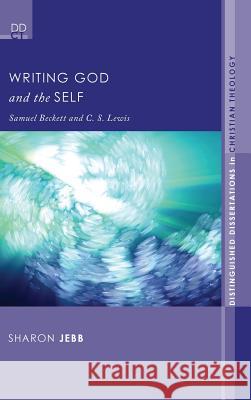Writing God and the Self » książka
Writing God and the Self
ISBN-13: 9781498257473 / Angielski / Twarda / 2011 / 292 str.
Writing God and the Self
ISBN-13: 9781498257473 / Angielski / Twarda / 2011 / 292 str.
(netto: 227,05 VAT: 5%)
Najniższa cena z 30 dni: 235,11
ok. 16-18 dni roboczych.
Darmowa dostawa!
Description: Contemporary literature has, for several decades and in various guises, been dominated by questions of identity and the self. It has been forgotten that, until the Enlightenment, theological reflection emphasized the close connectedness of the self with God; knowledge of God is essential to knowledge of the self; and vice-versa, correct knowledge of the self is a necessary correlate to true knowledge of God. This has been called the double knowledge. Writing God and the Self examines two literary texts and lives as representative of two antithetical positions. The first, represented by Samuel Beckett's life and his Three Novels, is that the self is independent of God; the second, represented by C. S. Lewis and Till We Have Faces, is that God and the self are intimately connected. Beckett's radical apophaticism about God is shown to be tied to his extreme apophaticism about the self, whereas Lewis's sense of selfhood is demonstrated to be integrally connected to his sense of a personal and self-transcending God. Other voices--Augustine, Teresa of Avila, Charles Taylor, Rowan Williams, Mark McIntosh and Vladimir Lossky--join the chorus of theologians, psychologists, and other thinkers, past and present, that contribute to this exploration of what Christian theology has to say about the insistent problem of the self. Taken together, all these voices articulate a powerful vision of selfhood in relation to God that is desperately needed today. Endorsements: ""Samuel Beckett and C. S. Lewis are two names most of us are probably unlikely ever to use in the same sentence. Seeing beyondthe obvious differences which set Beckett and Lewis apart, Dr Jebb traces some deep underlying concerns and in doing so invites us to reckon with each in a new way. The result is an illuminating study and a valuablestimulus to further constructive conversation between theology and literature."" --Trevor Hart Institute for Theology, Imagination and the Arts University of St Andrews ""In Writing God and the Self, Sharon Jebb provides a deft critique of the concept of the autonomous self. Drawing upon Samuel Becket, C. S. Lewis, and the history of Christian thought, she offers an alternative vision of the self as a dynamic agent that finds its deepest freedom and fulfillment in its relationship to God. This is a wise and insightful work of Christian scholarship."" -Roger Lundin Blanchard Professor of English Wheaton College ""A penetrating exploration of the intertwining of God-knowledge and self-knowledge. Highly unusual also-in that Jebb's conversation partners are two literary figures we wouldn't quickly associate. A fascinating and important book."" -Jeremy Begbie Thomas A. Langford Research Professor in Theology Duke University About the Contributor(s): Sharon Jebb is a lecturer in literature and theology and in spiritual theology. She is currently teaching at the University of Aberdeen, and at Union Theological College, Belfast."
Description:Contemporary literature has, for several decades and in various guises, been dominated by questions of identity and the self. It has been forgotten that, until the Enlightenment, theological reflection emphasized the close connectedness of the self with God; knowledge of God is essential to knowledge of the self; and vice-versa, correct knowledge of the self is a necessary correlate to true knowledge of God. This has been called the double knowledge.Writing God and the Self examines two literary texts and lives as representative of two antithetical positions. The first, represented by Samuel Becketts life and his Three Novels, is that the self is independent of God; the second, represented by C. S. Lewis and Till We Have Faces, is that God and the self are intimately connected. Becketts radical apophaticism about God is shown to be tied to his extreme apophaticism about the self, whereas Lewiss sense of selfhood is demonstrated to be integrally connected to his sense of a personal and self-transcending God. Other voices--Augustine, Teresa of Avila, Charles Taylor, Rowan Williams, Mark McIntosh and Vladimir Lossky--join the chorus of theologians, psychologists, and other thinkers, past and present, that contribute to this exploration of what Christian theology has to say about the insistent problem of the self. Taken together, all these voices articulate a powerful vision of selfhood in relation to God that is desperately needed today. Endorsements:""Samuel Beckett and C. S. Lewis are two names most of us are probably unlikely ever to use in the same sentence. Seeing beyond the obvious differences which set Beckett and Lewis apart, Dr Jebb traces some deep underlying concerns and in doing so invites us to reckon with each in a new way. The result is an illuminating study and a valuable stimulus to further constructive conversation between theology and literature.""--Trevor HartInstitute for Theology, Imagination and the ArtsUniversity of St Andrews""In Writing God and the Self, Sharon Jebb provides a deft critique of the concept of the autonomous self. Drawing upon Samuel Becket, C. S. Lewis, and the history of Christian thought, she offers an alternative vision of the self as a dynamic agent that finds its deepest freedom and fulfillment in its relationship to God. This is a wise and insightful work of Christian scholarship.""-Roger LundinBlanchard Professor of EnglishWheaton College""A penetrating exploration of the intertwining of God-knowledge and self-knowledge. Highly unusual also-in that Jebbs conversation partners are two literary figures we wouldnt quickly associate. A fascinating and important book.""-Jeremy BegbieThomas A. Langford Research Professor in TheologyDuke UniversityAbout the Contributor(s):Sharon Jebb is a lecturer in literature and theology and in spiritual theology. She is currently teaching at the University of Aberdeen, and at Union Theological College, Belfast.











